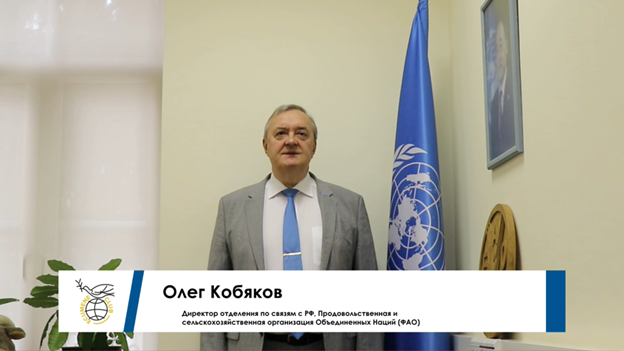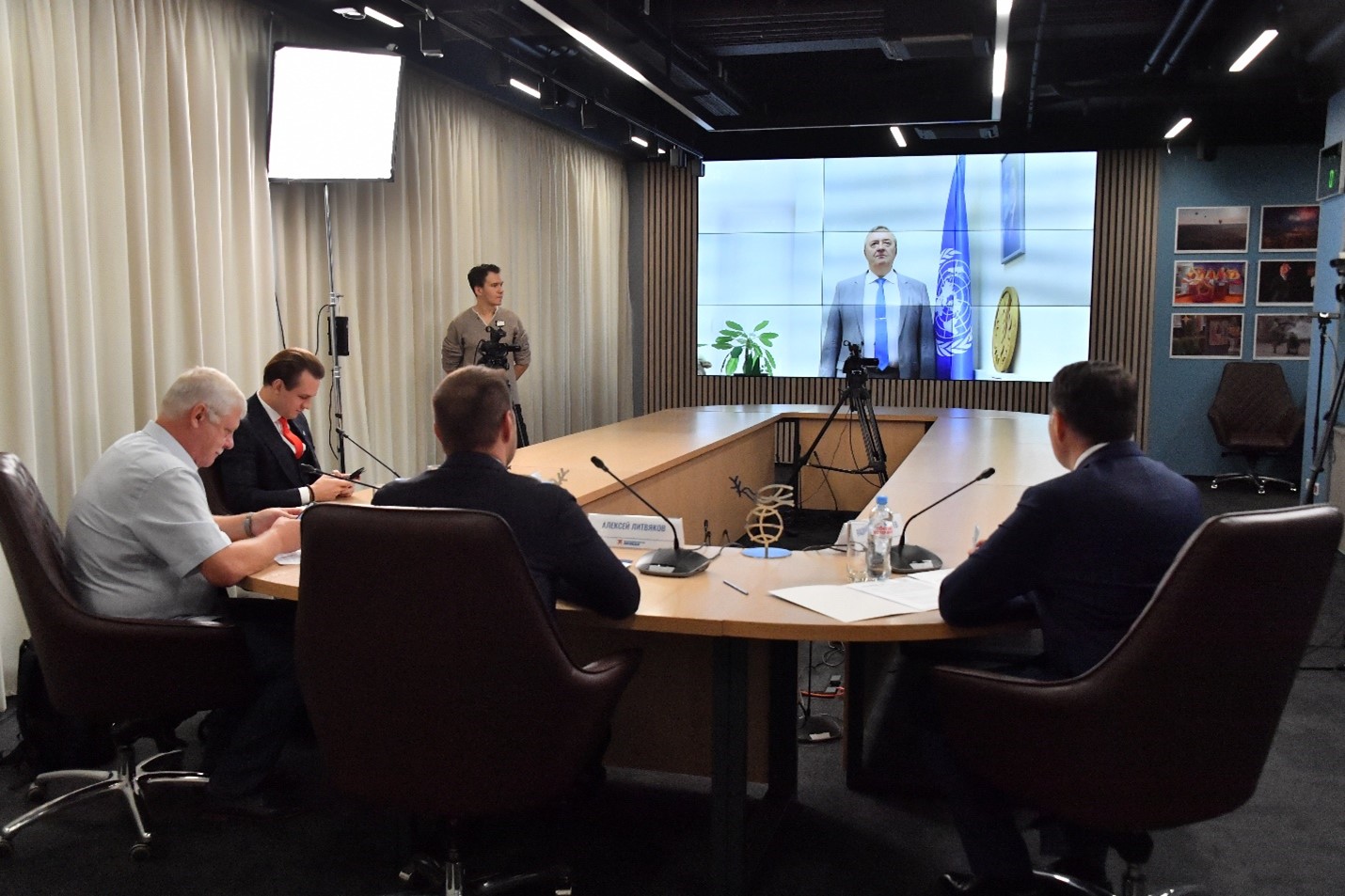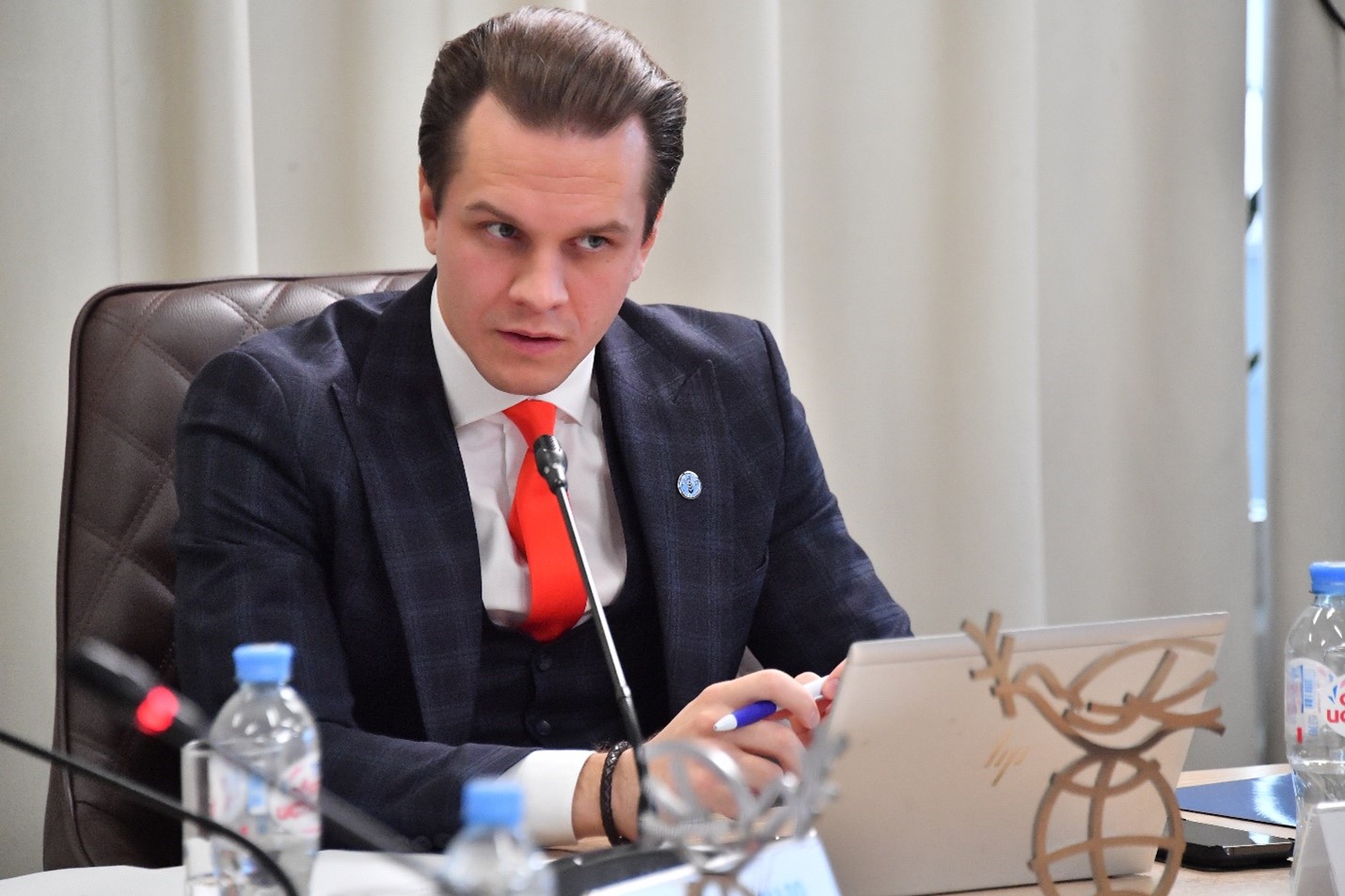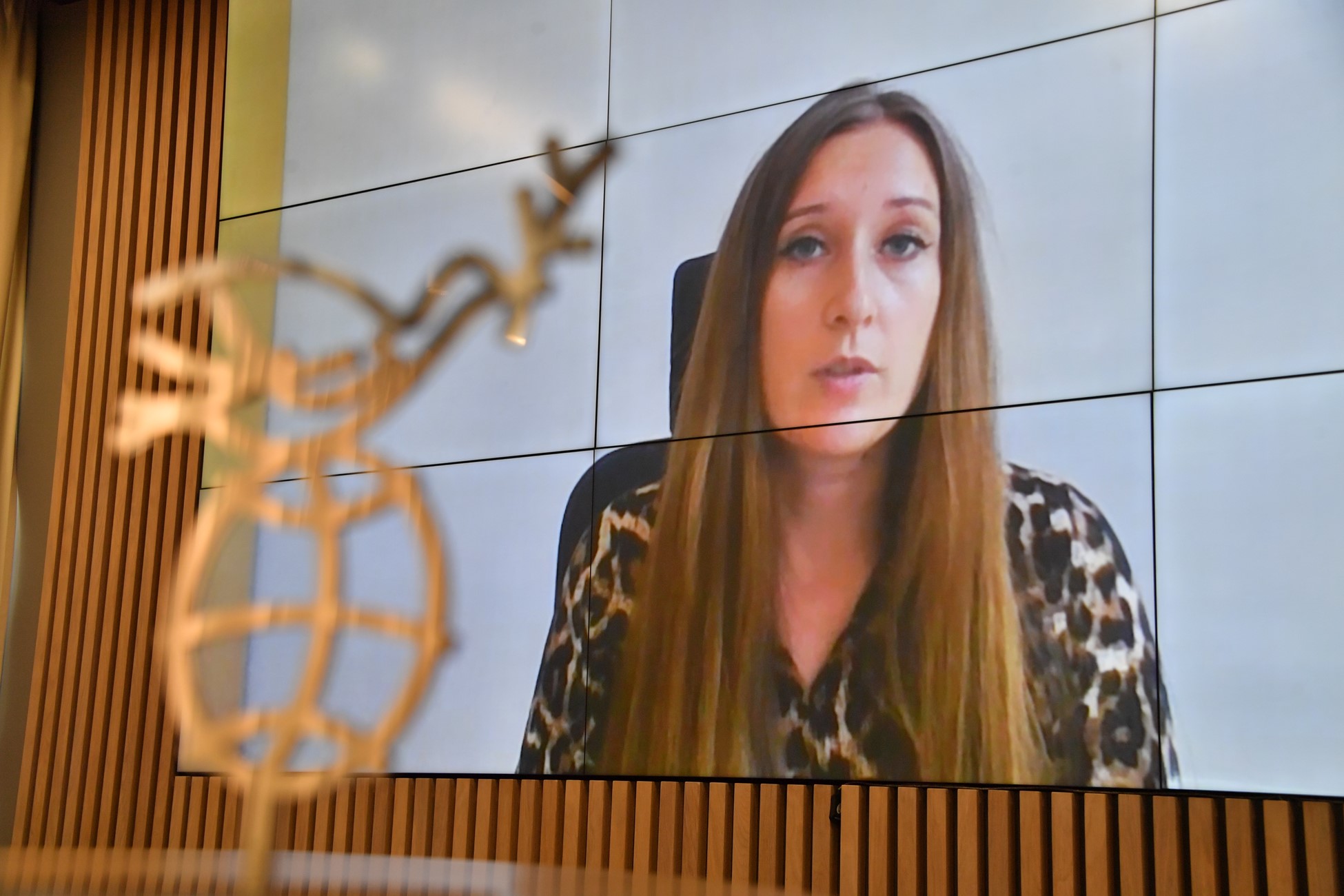FAO in anticipation of #COP29: climate and food security

©Komsomolskaya Pravda
On 19 September, the office of the Komsomolskaya Pravda newspaper held a Food Security round table as part of the Ecumene discussion club session.
Its participants talked about the matters pertaining to inclusivity, efficiency, stability, and reliability of global food systems. They also touched upon the importance of strengthening cooperation and sustainable development of BRICS countries in the field of agriculture and rural areas.
Oleg Kobiakov, Director of the FAO Liaison Office with the Russian Federation, welcomed the participants of the discussion. It was also attended by Eduard Porvatov, Consultant of the Moscow FAO Office, and Yvette Zenina, Natural Resources Officer of the FAO Subregional Office for Central Asia.
Oleg Kobiakov expressed his gratitude to the organizers for the opportunity to take part in this significant event and wished everyone productive work at the forum.

“On 16 October FAO turns 79. Throughout this long journey, we have been fighting hunger hand in hand with governmental and non-governmental partners. In line with its mandate, FAO works to ensure that the world eradicates hunger and malnutrition in all its forms by 2030. However, today we are still very far from reaching Sustainable Development Goal 2 aimed at ending hunger. At the same time, the prevalence of undernourishment in the world has remained almost at the same level for three years in a row, after a sharp increase caused by the global COVID-19 pandemic,” the FAO representative said.
He also cited up-to-date data from the recent edition of the FAO report, The State of Food Security and Nutrition in the World 2024, “Last year, 713 to 757 million people in the world, or every eleventh person on the planet, faced chronic hunger. At the regional level, hunger continues to rise in Africa, where one in five people suffers from hunger. In contrast, hunger has remained unchanged in Asia, and notable progress has been made in Latin America and the Caribbean.

© Komsomolskaya Pravda
It is forecast that up to 582 million people will be chronically undernourished in 2030, with more than half of those in Africa. In fact, the prevalence of moderate or severe food insecurity has remained the same for three consecutive years. According to our estimates, in 2023, nearly 30% of the population, 2 billion 300 million people, experienced moderate or severe food insecurity. Around the world, women and rural people suffer more from food insecurity.
In 2023, moderate or severe food insecurity affected 32% of rural adults, compared with 30% of the suburban population and 26% of people in urban areas. At the same time, the gender gap in terms of food insecurity at the global level, which grew after the pandemic, decreased from 2.3% in 2022 to 1.3% in 2023.
The updated estimates show that more than a third of the world’s population, about 2 billion 800 million people, cannot afford a healthy diet, which reflects the problem of unequal economic access to nutritious foods.”
Oleg Kobiakov emphasized that Russia has historically completely overcome hunger, and the share of the population in the state of chronic hunger has been within the limits of statistical error for many years.
“Only with joint efforts and innovative approaches can we make progress towards achieving Goal 2 in accordance with the Four Betters philosophy of FAO: better production, better nutrition, a better environment and a better life, leaving no one behind,” he concluded.
Eduard Porvatov, FAO National Partnerships Consultant, told the participants about the upcoming FAO events and initiatives carried out by the office together with Russian partners. In this regard, he invited the audience to take part in the event in Moscow, which will be held as part of the World Food Forum on 15 October, and told them about GIAHS, the Globally Important Agricultural Heritage Systems programme implemented by FAO.

© Komsomolskaya Pravda
“As of now, FAO has already recognized over 80 sites worldwide under the GIAHS programme. Russia has enormous potential that we are just beginning to realize within this programme. The first application from the Russian Federation, traditional wild honey farming of the Bashkir people, has been very recently submitted to the GIAHS Secretariat from the Republic of Bashkortostan through the Ministry of Foreign Affairs and the Ministry of Agriculture. We are convinced that this application will successfully receive the GIAHS status, and there will be many more similar applications from Russia,” he said.
Vladimir Pushkarev, member of the Federation Council Committee on Agriculture and Food Policy and Environmental Management, highlighted that the Committee is heavily focused on the matters of food security, and special attention is paid to the development of the organic products market.
“In recent years, Russian industrial agriculture has achieved significant success, becoming one of the driving forces of the country’s economy. We are seeing an increase in economic efficiency and productivity in agriculture, especially in such areas as crop production, livestock production and fishery. In 2023, agricultural exports amounted to 43.5 billion dollars, and the volume of supplies to the international market exceeded 70 million tonnes, which is 8% more than the previous year. Grain supplies to Africa and Asia are expanding; exports of barley to Qatar, wheat to Serbia, and oilseed crops to Morocco and Vietnam have begun. India and Egypt have purchased Russian juices for the first time,” he noted.
“A federal law on organic production has been in effect in Russia since 2020. On 4 July 2023, a strategy for the development of organic production up to 2030 was adopted, creating conditions for increasing the output of environmentally friendly products. Currently, there are more than 150 certified organic producers from 48 regions of Russia in the market, and there are over 1000 items in the product range.
According to the strategy, by 2030, the production of organic products for the domestic market has to increase to 114.5 billion roubles with an annual growth of 20%. It is planned for the organic product consumption in the country to reach 150 billion roubles. Russia also intends to increase the export of organic food, with priority markets being China, the Gulf countries, Southeast Asia, and neighbouring countries.”
Nadezhda Dementyeva, Regional Liaison Officer for countries of Central and Eastern Europe and Central Asia at the Secretariat of the United Nations Convention to Combat Desertification (UNCCD), spoke about the main drought problems that directly affect food security and nutrition in the world, which are addressed within the CCD.
She cited data from the Global Drought Snapshot report presented at the climate negotiations in Dubai last year, as well as CCD statistics, “By 2030, 1.5 billion hectares of degraded land, much of which is agricultural land, need to be restored,” she noted. “The land degradation balance was approved as part of the 2030 Agenda. To rectify the consequences of desertification, we need environmentally sound land use practices and sustainable resource management technologies.
This year, we celebrate the 30th anniversary of the CCD. This is an important moment when 197 participating countries, including Russia, will discuss further development of cooperation based on this international document at the 16th Conference of the Parties, which will be held in Riyadh (Saudi Arabia) this year. We hope that the decisions made will help to join efforts for achieving food security.”
Yvette Zenina, Natural Resources Officer of the FAO Subregional Office for Central Asia, talked about the climate dualism of agrosystems: “On the one hand, they can be a source of greenhouse gases, such as methane, which is emitted by farm animals. On the other hand, agrosystems, especially soils, can absorb and store carbon thanks to sustainable agricultural and forestry practices.”
The FAO specialist also told the audience about the outcomes of the 28th UN Climate Change Conference, where a joint declaration on agriculture and climate action was signed, “A fund for responding to loss and damage, which is also linked to ecosystems, was created. The FAST (Food and Agriculture for Sustainable Transformation) Initiative received support.”
“This year, for the 29th UN Climate Change Conference, Azerbaijan, which assumes the presidency, has presented the Harmony initiative, which FAO supports. The initiative is aimed at improving knowledge and increasing investments in agrifood systems, as well as assisting development through various technologies and funding,” she said.

Vladimir Moshkalo, Head of the UNEP Office in Russia, emphasized the interconnection of nature and food security in his speech. The UNEP representative talked about a joint FAO and UNEP initiative as part of the UN Decade on Ecosystem Restoration and the three challenges currently faced by humanity: climate change and its consequences, biodiversity loss, and environmental pollution, especially regarding the fight against plastic pollution.
He noted that one of the areas of UNEP’s work is facilitating UN member states in developing international legal treaties, including the future convention on limiting the use of plastic.
Natalia Kuvshinova, Senator of the Russian Federation, noted that today, the Altai Krai is one of the leading regions in terms of industrial agriculture, not only in the Siberian Federal District but also in the country, “Our region ranks first in Russia in terms of arable lands. They occupy over 6.5 million hectares.”
“About 70% of the region’s agricultural products are supplied to other regions of the Russian Federation and exported to other countries, primarily Kazakhstan, China, Mongolia, Uzbekistan, Kyrgyzstan, Iran, around 50–58 countries to which there is systemic export of products from the Altai Krai,” she shared.
These products include Altai buckwheat which accounts for two-thirds of all buckwheat produced in Russia and 20% of buckwheat produced in the world, as well as Altai cheeses, grain, flour, honey, and butter. “Talking about the ability to meet the needs of residents, and there are more than 2 million residents in the Altai Krai, for a number of items, for example, flour or groats, the products produced exceed the needs of people in the region by 10–20 times.”
“Regarding export, if we compare 2018 and 2023, for the value of agricultural exports, the difference was three times in monetary terms, or over 600 million dollars in 2023. Thus, the products made in the Altai Krai are not just about the quantity but also the quality we all know: a special wheat gluten from which hard varieties of pasta are made and cheeses that are probably known far beyond our region,” Natalia Kuvshinova summed up her speech.
You can watch full talks of the speakers at the session in the recording.
The Ecumene Forum brought together 180 speakers from 36 countries, and over 730 thousand viewers from 50 countries watched its work. The forum became the platform to prepare Russian participants for the 29th Conference of the Parties to the UN Framework Convention on Climate Change that will be held in Baku, Azerbaijan, from 11 to 22 November 2024.
